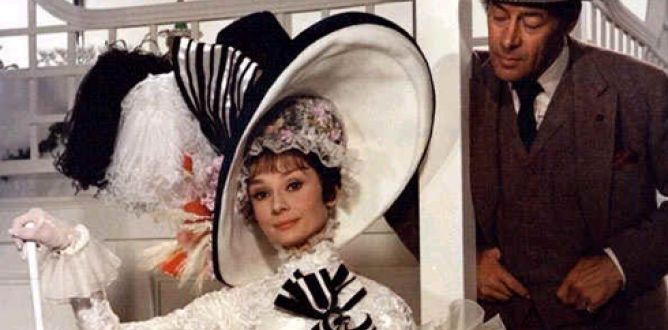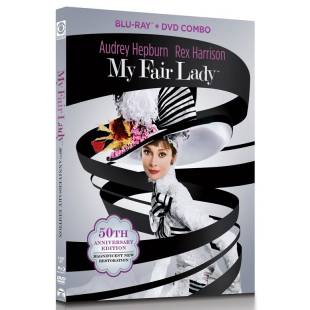My Fair Lady Parent Guide
Judging by the enduring nature of this story, I think it is safe to say about the author, "You did it! You did it! You said that you would do it, and indeed you did."
Parent Movie Review
After My Fair Lady took New York and London by storm, Jack Warner decided to purchase the rights to the musical,which was based on the play Pygmalion by George Barnard Shaw.
Hoping to ensure box office success, the Warner Brothers Studio made a few alterations while converting the production from stage to silver screen. The most obvious change was replacing the newly discovered Julie Andrews, who starred in the title role in the Broadway version, with the better known, but less musically talented Audrey Hepburn. (Hepburn’s singing voice was dubbed over by the sure-bet, ghost-soloist Marni Nixon—much to the actress’s disappointment.) Luckily, Rex Harrison and Stanley Holloway, also associated with the stage play, were able to hang onto their parts. Just as controversial was the decision to shoot on a soundstage in California, rather than the UK. As the story is set in London, stars mostly British actors and is all about the proper use of English (one line of lyrics accuses the Americans of having not spoken that language in years…), the choice was not a popular one.
Yet from such public relations stumbles emerges one of the most sure-footed movie musicals of all time. Thanks to amazing sets, glamorous costumes and stunning visuals, plus witty lyrics by Alan Jay Lerner and catchy music by Frederick Loewe, the film sweepingly introduces the not-so-fair Eliza Doolittle (Hepburn), a common flower girl who is about to become a lady.
Peddling her petals to the wealthy patrons of the Covent Garden Opera House, she happens to meet Henry Higgins (Rex Harrison), a professor of phonetics. After publicly humiliating her over her cockney accent, he boasts that he could elevate the social class of this “draggle-tailed guttersnipe” simply by teaching her to talk “more genteel”. His claim catches the attention of a bystander named Colonel Pickering (Wilfrid Hyde-White), a retired military man with a similar curiosity about dialects. And their conversation sparks within the simple girl a desire to change her circumstances.
However, when Eliza drops by Professor Higgins’ residence the next day, offering to pay for English lessons, she is met with more verbal berating. And she isn’t taken seriously until Colonel Pickering challenges Higgins to a bet: He will cover all the costs of the experiment (lessons, clothes, room and board) if the Professor really can transform the “deliciously low and horribly dirty” young woman into something that can be passed off as a duchess at the upcoming Embassy Ball.
So begins six months of intensive training, depicted through a delightful string of musical numbers (including The Rain in Spain and I Could Have Danced All Night). Along the way, Higgins’ ego, narcissism and disdain for women are also revealed (in An Ordinary Man and You Did It). After a trip to the Ascot Races, even though Eliza lets a swear word slip, Higgins’ obvious lack of manners and social graces suddenly has the audience wondering if it might not be easier to make a lady out of Eliza than a gentleman out of Henry Higgins!
Perhaps that is the true genius of the script. While the Professor asserts that all it takes to be a lady is to act and speak like one, Eliza contests it has more to do with attitude. “The difference between a lady and a flower girl is not how she behaves, but how she is treated,” she explains. To prove her point she gives this example: “I shall always be a flower girl to Professor Higgins because he always treats me as a flower girl, and always will. But I know that I will always be a lady to Colonel Pickering because he always treats me as a lady, and always will.” (My Fair Lady, Act 2, Scene 5)
Although the ending of the film is a little ambiguous, there is no question viewers will find lots to think about in this portrayal of the differences between men and women, the lower class and the upper crust, and the ignorant and the educated. Other characters within the film mirror these themes as well, such as Eliza’s alcoholic, philosophical-but-morally-bankrupt father Alfred P. Doolittle (Stanley Holloway) and her aristocratic-though-penniless admirer Freddy Eynsford-Hill (Jeremy Brett).
Maintaining the satire George Bernard Shaw became famous for, My Fair Lady challenges the outward appearance of each distinction, and bets watching this play will have you reexamining your own definitions too. If not, the playwright will have missed his mark. But judging by the enduring nature of this story, I think it is safe to say about the author, “You did it! You did it! You said that you would do it, and indeed you did.”
Directed by George Cukor. Starring Audrey Hepburn, Rex Harrison, Stanley Holloway. Running time: 170 minutes. Theatrical release December 25, 1964. Updated July 17, 2017
My Fair Lady
Rating & Content Info
Why is My Fair Lady rated G? My Fair Lady is rated G by the MPAA
Violence: Men treat a woman with little respect, often bullying her and uttering insults along with threats to physically abuse her. A woman daydreams about revenge, including having her taskmaster teacher executed. (A firing squad scene is acted out.) A piece of paper accidentally catches on fire, but does no real damage. Accusations of murder are discussed. A character brags about blackmailing others. A distressed woman makes a reference to suicide. An angry man almost strikes a woman who has thrown his slippers at him.
Sexual Content: A woman thinks it is unhealthy and indecent to take a bath—she screams when a group of female servants try to undress her and put her in a bathtub. (Steam obscures any details.) References are made about infidelity and un-married sexual relations. The prospect of getting married is equated with death. Barmaids wear low cleavage dresses, and dance with male patrons. A man playfully smacks a woman’s bottom. The phrase “make love to me” is used in the sense of dating, not sex.
Language: Several mild profanities, a couple of moderate swear words and a few terms of Deity are used, along with some colloquial slang.Frequent name-calling and insults are heard.
Alcohol / Drug Use: A man, depicted as an alcoholic, unabashedly begs for money to buy drinks. Drinking sprees and pub-crawls are mentioned and depicted. Other characters drink socially and when facing stress. Characters occasionally smoke cigars. The use of gin as a medicine is discussed.
Other: Characters engage in betting, privately and at the horse races.
Page last updated July 17, 2017
My Fair Lady Parents' Guide
This movie is adapted from a musical stage play that was based on the play Pygmalion by George Barnard Shaw. Learn more about the history of the production of My Fair Lady.
Why does Henry Higgins think Eliza’s father, Alfred P. Doolittle, is such an original thinker? How does he use his brand of logic to justify his immoral behavior? What is the danger of listening to persuasive arguments when determining personal values and ethics? Where should these codes of behavior come from? Should particular circumstances or situations sway what we believe to be right and wrong?
Eliza continuously reminds Professor Higgins, “I’m a good girl, I am.” What does she mean? After she goes through her makeover, Higgins suggests that she look for someone to marry. Eliza replies, “I was above that at Covent Garden. I sold flowers, not myself.” Is there a difference between a street girl selling herself and a society girl marrying for money? Why might one seem more acceptable than the other?
What do you think happens to the characters of Eliza, Higgins, Colonel Pickering and Freddy after the movie ends? What sorts of relationships do you think they would have? Who do you think Eliza should marry? Why?
Home Video
The most recent home video release of My Fair Lady movie is October 27, 2015. Here are some details…
Home Video Notes: My Fair Lady - 50th Anniversary Edition Release Date: 27 October 2015 My Fair Lady releases to home video (Blu-ray/DVD Combo Pack) in a 50th Anniversary Edition. This carefully restored film comes packaged with ninety minutes of bonus extras including trailers and promotional materials.
Related home video titles:
Another man attempts to improve a stutterer’s ability to speak in The King’s Speech. Rex Harrison plays a similar male chauvinist in Doctor Dolittle. And Audrey Hepburn can be seen in Breakfast at Tiffany’s, Roman Holiday and Charade.



